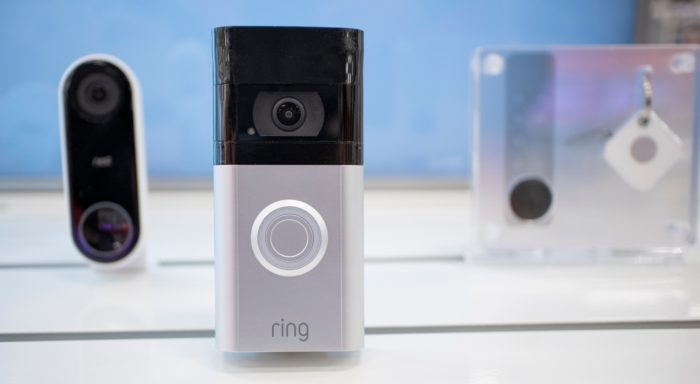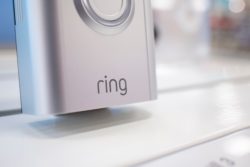Top Class Actions’s website and social media posts use affiliate links. If you make a purchase using such links, we may receive a commission, but it will not result in any additional charges to you. Please review our Affiliate Link Disclosure for more information.

(Photo Credit: CC Photo Labs/Shutterstock)
Update:
- Amazon can’t escape a class action lawsuit alleging its Ring video doorbells violate privacy law by collecting and storing facial biometric data without consent, a Seattle federal judge has ruled.
- In an order issued Aug. 3, U.S. District Judge John C. Coughenour denied Ring LLC’s motion to dismiss the class action filed against it by plaintiff Michelle Wise.
- Wise alleges Ring violates the Illinois Biometric Information Privacy Act because the company collects and stores face scans of visitors and passersby captured on its video doorbells.
- Ring argued the claim could not move forward because Ring has no contractual relationship with visitors and passersby and no other identifying information related to those people.
- However, Judge Coughenour said, while courts were divided on how to apply the law in these cases, it was too early to dismiss the case.
(Sept 1, 2020)
Amazon’s Ring video doorbells violate privacy law by collecting biometric data without consent and sharing it with law enforcement agencies, a recent class action lawsuit alleges.
Plaintiff Michelle Wise argues Ring video doorbells are allegedly storing data on “millions of unwitting” people to improve Amazon’s facial recognition technology. Wise filed a class action lawsuit against Amazon challenging these practices. The claims were recently removed to federal court due to the amount in controversy.
Wise claims that Ring video doorbells stored her “biometric data by allowing its facial recognition software to scan her facial features, including the contours of her face, and the distances between her eyes, nose, and ears.” While Ring customers themselves were asked for permission to gather this data, others in the vicinity of the cameras were not, according to the Ring video doorbells class action lawsuit.
This violates Illinois’ Biometric Information Protection Act, the Ring video doorbells class action lawsuit alleges. BIPA, a privacy law passed by state lawmakers in 2008, regulates companies who collect and store biometric data. The law requires consent, secure storage, and timely destruction of this private data. The plaintiff says Ring video doorbells have not satisfied any of these privacy law requirements.
“Ring is actively collecting, storing, and using — without providing notice, obtaining informed written consent, or publishing data retention policies — the biometrics of millions of unwitting individuals whose faces appear in video footage captured by Ring Cameras and stored by Ring,” the Ring video doorbell class action lawsuit contends.
Wise alleges in her Ring video doorbell class action lawsuit the company further violates privacy laws with their technology by creating “face templates.” These are defined as “highly detailed geometric maps of the face” and are unique to each person the same way a voice or fingerprints are.
The plaintiff says this data is stored insecurely and Ring therefore does not follow privacy law requirements. The Ring video doorbell class action lawsuit says Ring video doorbells share video footage captured by the devices with its employees. The video itself is allegedly distributed in an unencrypted way allowing “staff around the world to have essentially unfettered access.”
Furthermore, the Ring video doorbell class action lawsuit alleges Ring video doorbells have partnered with law enforcement agencies to violate consumer privacy. In 2018, Ring reportedly filed a patent for technology that uses facial recognition software to communicate with law enforcement databases to match “suspicious” people. At one point, a heat map of Ring video doorbells’ locations was allegedly provided to police.

Wise points to a recent settlement Facebook made as precedent for her claims against Amazon. In this settlement, the social media giant agreed to pay $550 million for breaking privacy laws by using similar “face templates” and facial recognition technology, The Associated Press reported. Facebook turned off that feature by default last year as part of the agreement.
The Ring video doorbell system was a fledgling startup until 2015, when Richard Branson invested $28 million into the company after seeing a Ring customer on vacation pull up a live feed of his San Francisco home, according to The Next Web. The Ring video door was later purchased by Amazon in 2018 for more than $839 million.
Since then, Ring says, the devices have been installed on “millions” of doors, according to Vox, although exact numbers aren’t disclosed. Ring video doorbells are part of a growing market of internet-enabled security devices. A survey found 36% of homes have such devices installed on their front doors, totaling to an estimated 20 million households, The Associated Press reported.
However, this new technology is reportedly causing privacy issues, as there have been several widely reported instances of Ring “hacking.” A stranger was reportedly able to communicate with a young Florida girl while she was in her bedroom, the BBC reported. A similar incident prompted an Alabama father to file a lawsuit, according to the BBC. And Florida couple says they were subjected to racist attacks as they got ready for bed, according to an ABC News report.
Beyond privacy issues, technology used in the Ring video doorbell system has issues with accuracy, especially with people of color. Research from MIT and the University of Toronto show dark-skinned people are often mistakenly identified, according to Vox.
Have you purchased Ring video doorbells? Let us know in the comments below.
The plaintiff is represented by Beth E. Terrell, Adrienne D. McEntee and Benjamin M. Drachler of Terrell Marshall Law Group PLLC; Natalie F. Finkelman Jayne A. Goldstein James C. Shah of Shepherd, Finkelman, Miller & Shah LLP; Katrina Carroll Kyle A. Shamberg of Carlson Lynch, LLP.
The Ring Video Doorbells Class Action Lawsuit is Michelle Wise v. Ring LLC, Case No. 2:20-cv-01298, in the U.S. District Court for the Western District of Washington.
Read About More Class Action Lawsuits & Class Action Settlements:
Protesters Sue Detroit, Mayor and Cops Over Alleged Police Brutality
Is California a One Party Consent State?
Tribal, LGBTQ Foster Youth Data Collection Should Continue, Advocates Say















1,354 thoughts onRing class action over face scan privacy escapes dismissal
Add me I have the camera for 4 years and pay for subscription yearly
I have purchased three Ring cameras from Amazon. Can I join this class action suit?
I phone a ring doorbell a ring motion sensor a ring spotlight cam plus I own solar panels to power the ring plus all ring products. I’m getting rid of them because I do not trust the company anymore. Please add me to the list for the lawsuits. So it’d be great if it’d be I could get my money back for these products that I spent.
That initial statement was actually supposed to say I bought not a phone so I purchased many ring items from Amazon and do not want to use them due to my discharge for the company after their violation of privacy laws
I have one. I’ve had issues with it. Please add me.